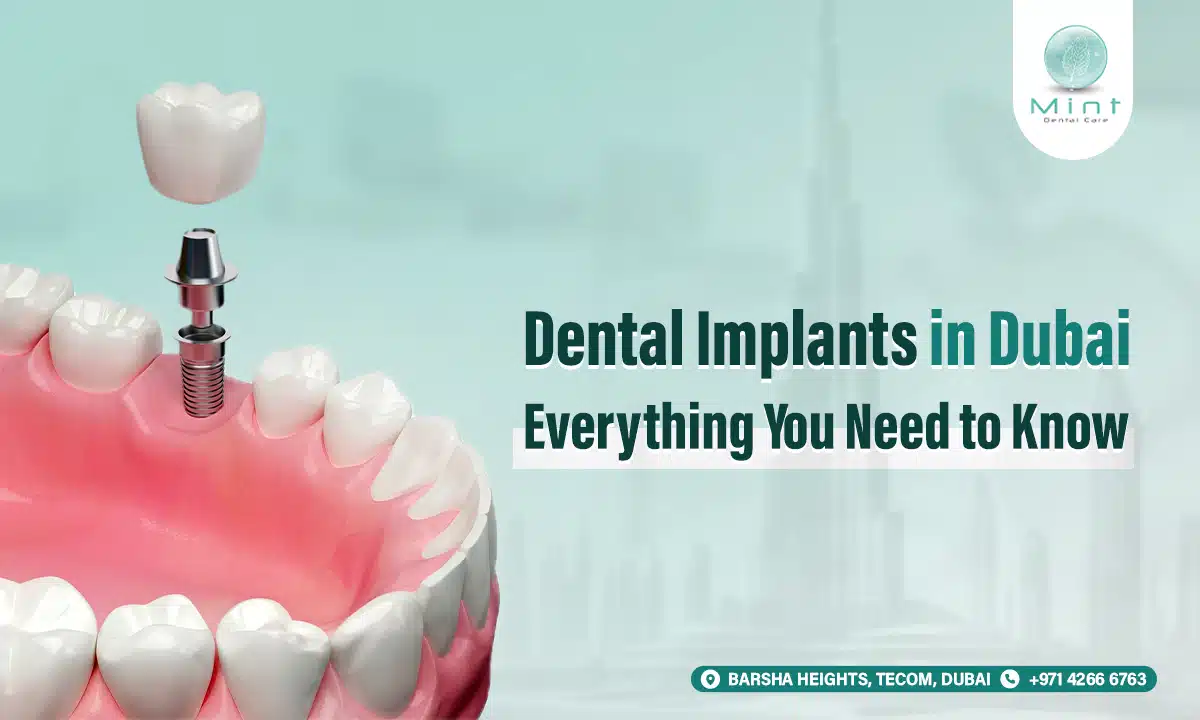Dental implants are a popular, permanent solution for those dealing with missing teeth, providing a natural look and function similar to real teeth. In Dubai, dental implants are increasingly sought after due to the city’s advanced dental services, experienced professionals, and access to state-of-the-art technology. This article offers a detailed look at everything you need to know about dental implants in Dubai, including the types, costs, procedures, and factors to consider when choosing a clinic.
What Are Dental Implants and Why Are They Beneficial?
Dental implants are artificial tooth roots, usually made of titanium, that are surgically placed into the jawbone to hold a replacement tooth or bridge. They offer several benefits over traditional dentures and bridges, making them a preferred option for many people.
Why Choose Dental Implants Over Other Options?
Dental implants offer unique advantages over other tooth replacement methods. Unlike dentures, implants are fixed in the mouth, meaning they don’t shift or require adhesives. They also look, feel, and function like natural teeth, providing confidence in speaking, eating, and smiling. With proper care, dental implants can last a lifetime, offering a long-term solution that helps prevent bone loss in the jaw, which often occurs after tooth loss.
Implants Improve Oral Health
Beyond aesthetics and functionality, dental implants play a crucial role in preserving oral health. They prevent the shifting of adjacent teeth, maintain the structure of the bite, and stimulate the jawbone, which helps prevent bone deterioration. This stability can significantly improve both appearance and the integrity of the face structure, making implants a valuable investment in both health and self-esteem.
Types of Dental Implants Are Available in Dubai
In Dubai, patients can choose from several types of implants, depending on their needs and bone structure. The two main types of implants are endosteal and subperiosteal implants, each offering unique benefits for specific cases.
What Are Endosteal Implants?
Endosteal implants are the most common type, placed directly into the jawbone. These implants typically consist of small screws made from titanium or another biocompatible material. Endosteal implants are suitable for patients with adequate jawbone density, as they require solid bone support for successful integration.
What Are Subperiosteal Implants?
Subperiosteal implants are placed under the gum but above the jawbone, making them an alternative for patients with insufficient bone density who cannot undergo bone grafting. While less common than endosteal implants, subperiosteal implants can be an excellent solution for those needing a quicker and less invasive option.
Who Is a Suitable Candidate for Dental Implants?
While dental implants are an effective solution for many, not everyone is an ideal candidate. Candidates typically need good oral and overall health, sufficient jawbone density, and healthy gums. However, even individuals with bone density concerns may still qualify after additional procedures.
What if I Don’t Have Enough Bone Density for Implants?
If a patient has insufficient jawbone density, dental clinics in Dubai offer solutions such as bone grafting. Bone grafting involves placing additional bone material in the jaw to strengthen it for the implant. Clinics may also use advanced techniques like 3D imaging to assess bone quality and plan accordingly. For patients who cannot undergo bone grafting, options like subperiosteal implants or alternative treatments such as dentures and bridges are available.
How Does the Dental Implant Procedure Work?
The dental implant process in Dubai generally involves four main steps: initial consultation, implant placement, abutment placement, and the final crown fitting. Each stage requires professional attention and precision to ensure the best results.
What Happens During the Consultation?
The consultation is the first step in determining whether you are a suitable candidate for dental implants. During this appointment, the dentist will conduct a comprehensive assessment, including 3D imaging or CBCT scans to examine the jaw structure and bone density. The dentist will also review your medical history, oral health, and treatment goals to customize a plan tailored to your needs.
What Is the Implant Placement Procedure Like?
In this step, the dentist surgically places the implant into the jawbone. This is typically done under local anesthesia, and many clinics in Dubai offer advanced, minimally invasive techniques to ensure comfort. After placement, a process called osseointegration begins, where the implant gradually fuses with the bone. This healing phase can take several months and is essential for creating a solid foundation for the replacement tooth.
What Role Does the Abutment Play in the Implant?
After osseointegration, an abutment is attached to the implant. The abutment acts as a connector, holding the replacement tooth (crown) in place. This stage usually requires a minor surgical procedure and is followed by a brief healing period.
How Is the Final Crown Placed?
The final step is placing a custom-made crown that resembles a natural tooth in shape, size, and color. The crown is designed to fit comfortably and align perfectly with the rest of your teeth. Clinics in Dubai often use CAD/CAM technology to create highly accurate crowns, ensuring a natural appearance and precise fit.
How Much Do Dental Implants Cost in Dubai?
The cost of dental implants in Dubai varies widely, influenced by several factors such as the number of implants, the need for additional procedures, and the expertise of the dental provider.
Are Financing Options Available for Dental Implants in Dubai?
Yes, many clinics in Dubai offer financing options to make dental implants more affordable. Payment plans, often with zero-interest financing or monthly installments, are common. These flexible options enable patients to spread out payments, reducing the financial burden. Checking with individual clinics can reveal specific financing opportunities, as terms and offers may vary.
How Can I Find the Right Dental Implant Clinic in Dubai?
Choosing a dental clinic for implants is a significant decision. Key factors to consider include the clinic’s reputation, dentist qualifications, and patient reviews. Dubai’s leading clinics often employ experienced implantologists and leverage advanced technology, ensuring high-quality results.
What Qualities Should I Look for in a Dentist?
Selecting a dentist with specialized training in implantology is essential. Consider factors like years of experience, success rates, and communication style. Top clinics in Dubai often have a team of certified implantologists and cosmetic dentists to provide seamless treatment and natural-looking results. Ensuring the dentist and team communicate clearly and make you feel comfortable throughout the process is also crucial.
How Does Technology Impact the Success of Dental Implants?
Dubai clinics frequently use the latest dental technology, such as 3D imaging, CAD/CAM, and CBCT scans. These tools enable precise implant placement, faster healing, and a more comfortable experience. Clinics that prioritize such innovations tend to deliver higher success rates and improved patient satisfaction.
What Post-Operative Care Is Needed for Dental Implants?
Proper aftercare is vital for the long-term success of dental implants. Following the dentist’s instructions can help ensure healing and prevent complications.
What Are the Key Components of Dental Implant Aftercare?
After implant surgery, it’s important to maintain good oral hygiene by brushing and flossing regularly. Avoiding hard or sticky foods during the healing period can also prevent complications. Dentists in Dubai often recommend using antibacterial mouthwash and attending regular follow-up appointments to monitor progress.
How Can I Ensure My Dental Implants Last a Lifetime?
Dental implants can last a lifetime with the right care. Regular dental check-ups, a balanced diet, and avoiding smoking are essential for maintaining implants and overall oral health. Following any specific instructions from your dentist can further improve the longevity of your implants.
Are There Any Risks or Side Effects Associated with Dental Implants?
While dental implants have a high success rate, they are not entirely without risks. Common risks include infection, implant failure, and nerve damage. Choosing a qualified and experienced dentist significantly reduces these risks.
What Should I Do If I Experience Pain or Complications?
Mild discomfort is normal after the procedure, but persistent pain or unusual symptoms should be addressed by your dentist. Most Dubai clinics provide comprehensive post-operative support and are available to answer questions, ensuring any issues are resolved promptly.
Frequently Asked Questions (FAQs) About Dental Implants
Are Dental Implants Painful?
The implant placement is performed under anesthesia, so patients usually experience minimal discomfort. Any post-surgical pain can typically be managed with over-the-counter pain relief.
How Long Does the Dental Implant Process Take?
The process varies based on individual needs, but it usually takes 3-6 months from the initial placement to the final crown fitting. Certain advanced options, such as immediate-load implants, are also available for those who qualify.
Can I Eat Normally with Dental Implants?
Yes, once fully healed, dental implants function like natural teeth, allowing you to eat all types of foods without worry. Dental implants offer excellent stability and strength, making them suitable for all dietary needs.
Conclusion
Dental implants are a reliable and long-lasting solution for missing teeth, combining functionality with a natural appearance. With advancements in dental technology and a commitment to high standards of care, Dubai is an ideal destination for dental implant treatment. By understanding the different types, costs, and procedures involved, and by choosing an experienced clinic, you can achieve a beautiful, healthy smile that lasts a lifetime.















